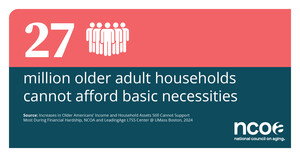National Council on Aging Responds with Employment Programs, Benefits Counseling for Economically Stressed Seniors
WASHINGTON, Oct. 12 /PRNewswire-USNewswire/ -- Millions of older adults who need to work in order to make ends meet continue to be frustrated by high rates of unemployment. Joblessness among seniors aged 65 and older has nearly doubled since the recession began in December 2007. At 6.2%, senior unemployment still hovers close to its historic high, according to figures from the U.S. Bureau of Labor Statistics (not seasonally adjusted).
(Logo: http://photos.prnewswire.com/prnh/20100615/NCOALOGO)
(Logo: http://www.newscom.com/cgi-bin/prnh/20100615/NCOALOGO)
The jobs outlook is even worse for adults age 55 and over, for whom unemployment has more than doubled in the same period, to 7.2%. Of this age group, African Americans and Hispanics have been disproportionally affected. Hispanic men are the worst off with an unemployment rate of almost 13% for individuals aged 55 and older.
Although economic pressure from the recession is causing more seniors to re-enter or staying longer in the workforce, those who lose a job tend to face longer periods of unemployment than younger workers do. Long stretches without paid work also force many older adults to spend down their savings when they would like to be adding to them. This undermines their long-term financial stability and security, especially if they become too ill or disabled to work, and underscores the fact that they have less time than younger people to catch up on lost wages and savings.
For low-income older workers, who can least afford it, the job search tends to be even longer and more challenging.
"Whether they've been laid off, had a family emergency, or simply can't survive on their retirement income, many older people desperately need to find a job or return to work," said Sandra Nathan, senior vice president of economic security for the National Council on Aging (NCOA). "It is essential that we support these seniors with job training and help them prepare to hold their own in today's competitive job market," she added.
Solutions from NCOA
NCOA offers a variety of programs to help older adults find work and connect with services that help them build financial stability and security for themselves and their families.
- NCOA's Senior Community Service Employment Program (SCSEP) offers valuable on-the-job training and job placement that helps older workers, particularly those who are low-income or disadvantaged, build job skills and confidence. NCOA currently operates 27 SCSEP projects in 11 states. SCSEP is funded by a grant from the U.S. Department of Labor.
- NCOA's Economic Security Initiative offers innovative programs in twelve communities to help economically disadvantaged older adults cut through red tape and create a plan to build their own economic stability and security. The service includes one-on-one assistance, counseling and follow-up as they find job training, assistance with healthcare and prescription drugs, housing and nutrition programs, and financial planning.
- The National Center for Benefits Outreach and Enrollment (NCBOE) helps organizations enroll seniors with limited means and younger adults with disabilities in a wide range of benefits programs. NCOA's online tool BenefitsCheckUp.org has helped more than 2.5 million people discover their eligibility for more than $8.9 billion in annual benefits.
More information on NCOA's economic security initiative and workforce development ideas can be found at www.ncoa.org/enhancing-economic-security.
About NCOA
The National Council on Aging is a non-profit service and advocacy organization headquartered in Washington, DC. NCOA is a national voice for older Americans - especially those who are vulnerable and disadvantaged - and the community organizations that serve them. It brings together non-profit organizations, businesses and government to develop creative solutions that improve the lives of all older adults. NCOA works with thousands of organizations across the country to help seniors find jobs and benefits, improve their health, live independently, and remain active in their communities. For more information, please visit www.NCOA.org
SOURCE National Council on Aging
WANT YOUR COMPANY'S NEWS FEATURED ON PRNEWSWIRE.COM?
Newsrooms &
Influencers
Digital Media
Outlets
Journalists
Opted In






Share this article